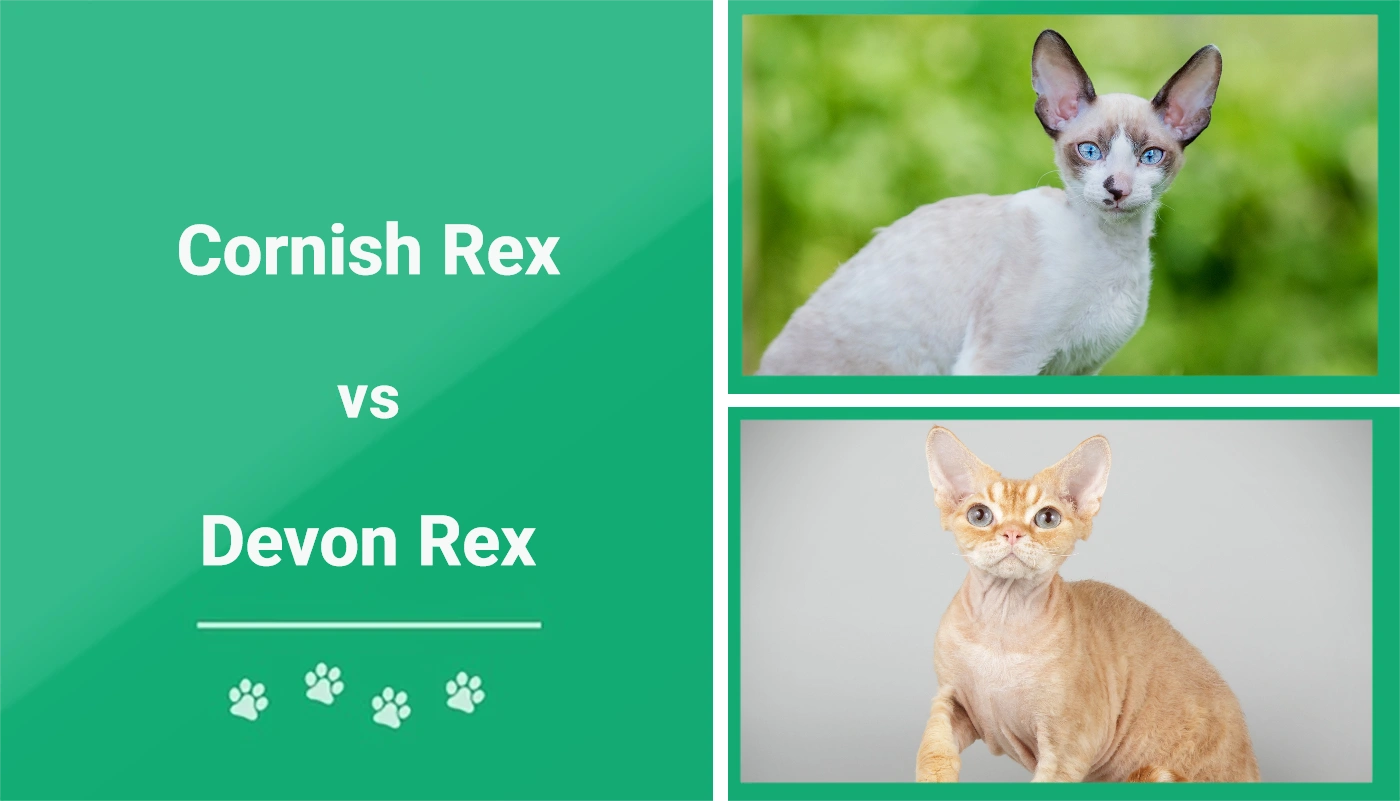The Cornish Rex and Devon Rex have an awful lot in common. Both originated in the UK, are sociable and fun-loving cats, and have quite a few similar physical traits, including a slender build, small, Pixie-like faces, and large, rounded but pointy ears. On closer inspection, however, you’re sure to notice some physical differences between the two.
There are also some important health and care considerations to take into account with these two breeds, so read on for the full lowdown.

Visual Differences
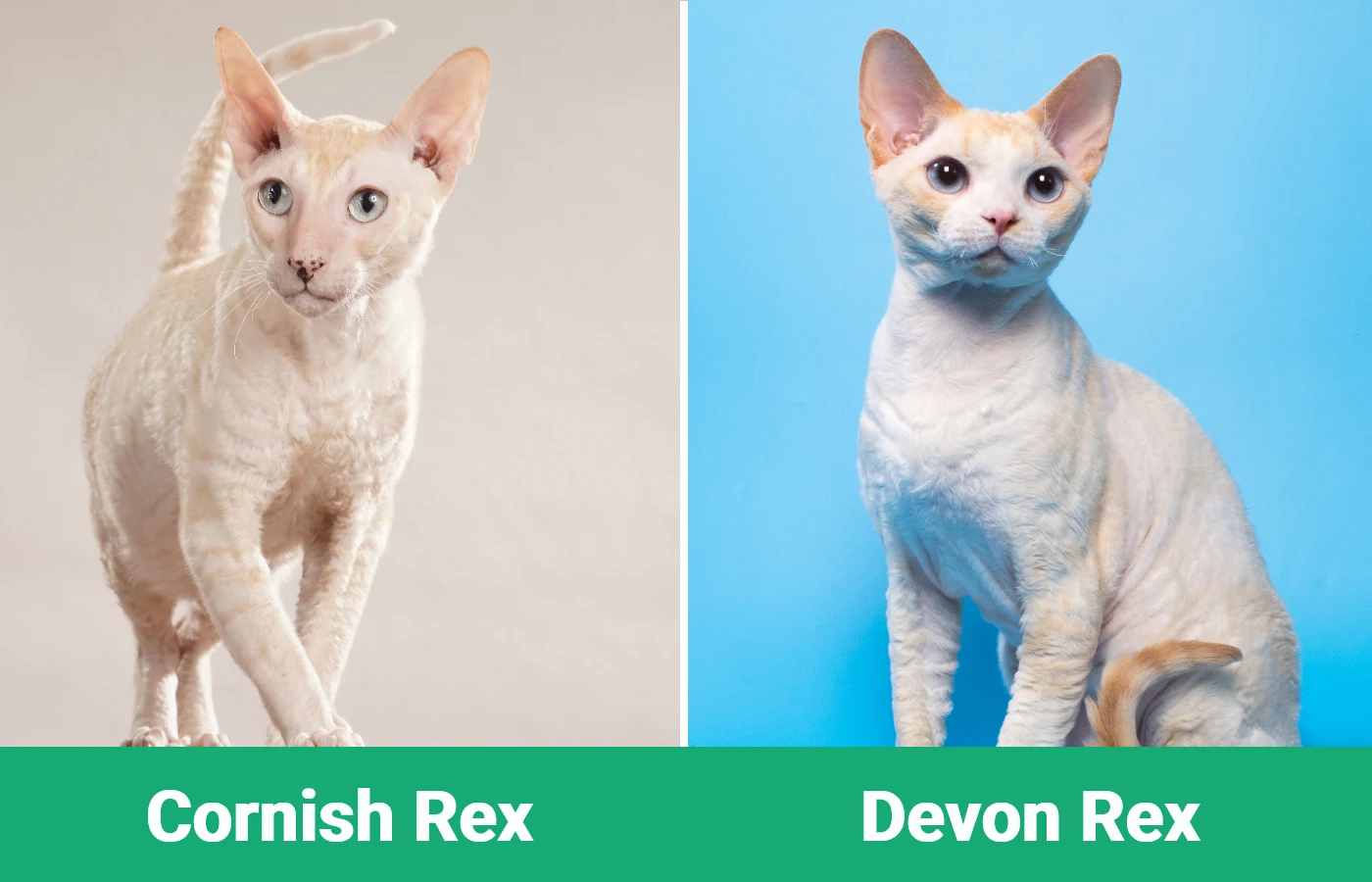
At a Glance
Cornish Rex
Devon Rex

Cornish Rex Overview
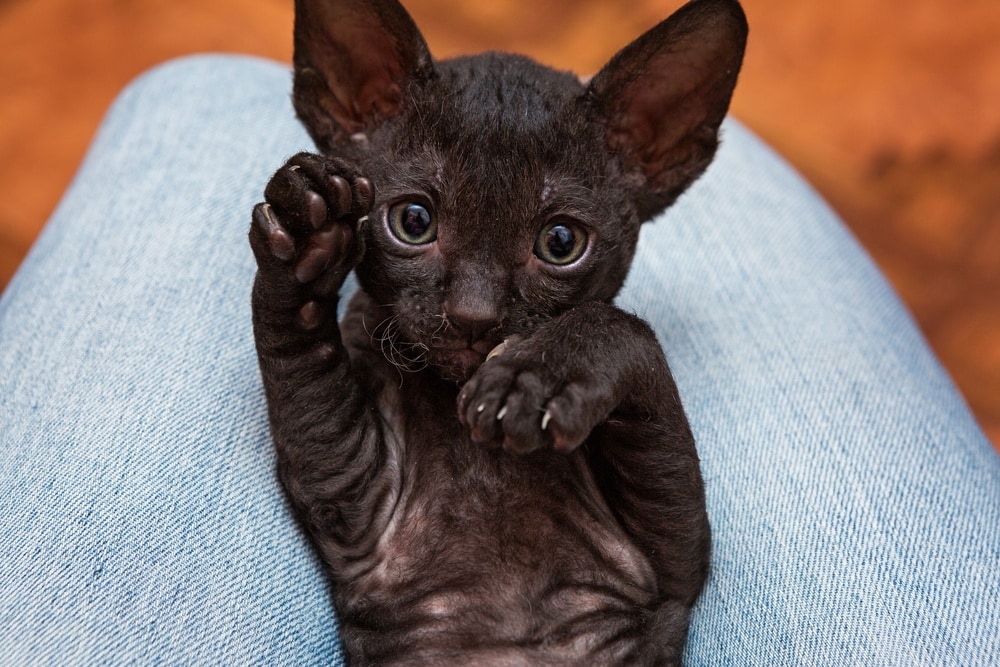
The Cornish Rex originated in Cornwall, England, where the first of these cats—a genetic mutation—was born in 1950. The first Cornish Rex kitten, Kallibunker, was noted for his unique curly coat and, as he grew up, his distinctively slender body, bat-like ears, and chiseled facial features. Killibunker continued to be bred to produce more curly-coated kittens, and the rest is history!
Appearance
The Cornish Rex is a small-to-medium-sized cat with an egg-shaped head, large, rounded but pointy ears, a slender, muscular physique, long legs, and big, round eyes that seem to give them a permanently surprised or inquisitive expression.
The curly coat that can come in a wide variety of colors is one of the Cornish Rex’s most distinguishing features. Though it may appear rough, the coat is fine, downy, soft, and has a surprisingly silky feel to it.
Personality
The Cornish Rex is a wonderful companion—friendly, affectionate, and playful. These active, spunky cats love nothing more than running, jumping, climbing, or playing with a fun, interactive toy. Some even learn to play games like fetch and catch, and their playfulness makes them great companions for sensible children.
If you plan to bring home a Cornish Rex, be sure to set up plenty of climbing spots like shelves and cat trees, ideally by a window. Your Cornish Rex will greatly appreciate being able to climb but also luxuriate in a nice, sunny spot.
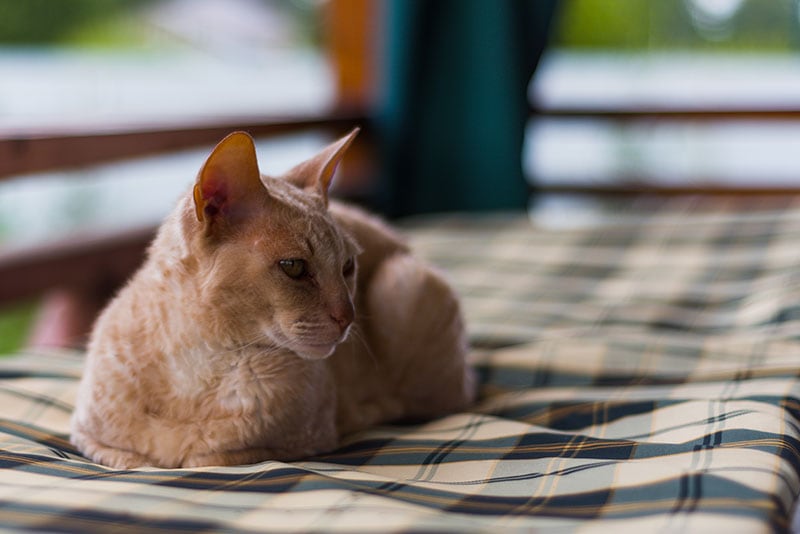
Training
Cornish Rexes are highly intelligent and adaptable cats, so it shouldn’t take them long to learn basic housetraining like using the litter box and scratching post. You can help ensure your Cornish Rex’s good behavior at home by providing plenty of outlets for their energy, because, if they get bored, they’re more likely to become destructive.
Health & Care
Though grooming the short-haired Cornish Rex isn’t difficult, it is a special kind of coat that can get oily very easily. This is because their coats are single-layered and very fine, so, when we touch them, the oil from our hands can build up on the skin and coat.
Too much oil can result in problems for the skin, so it might be a good idea to give your Cornish Rex a bath now and then to keep the oiliness down. There is a fine balance here, though—too much washing can dry out the skin.
Moreover, their coats are so fine, they lose heat more easily, so they often seek out warm areas, like your lap, a sunny spot, or near a radiator. The Cornish Rex should be an indoor cat to prevent them from being affected by cold temperatures or sunburn (another potential issue due to their fine coats).
The good news is that the Cornish Rex is generally healthy and has a long estimated lifespan. However, they can inherit certain conditions, including autosomal dominant polycystic kidney disease and progressive retinal atrophy. Sensitivity to anesthesia is another possibility with this breed.
Don’t panic—your Cornish Rex may never experience any of these conditions, but it’s always good to be aware of them.
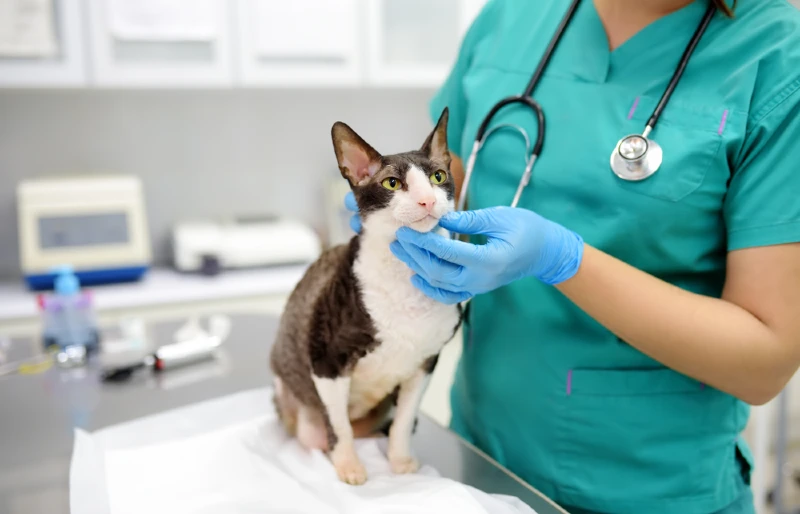
Suitable For:
The Cornish Rex is best suited to a committed family that will take the time to ensure this active, intelligent cat is mentally stimulated enough.
The family should set aside some time to play with the Cornish Rex every day and provide interactive toys and climbing spots to keep them entertained. The Cornish Rex is a great feline friend for kids, as long as kids are gentle and sensible when interacting with them.

Devon Rex Overview
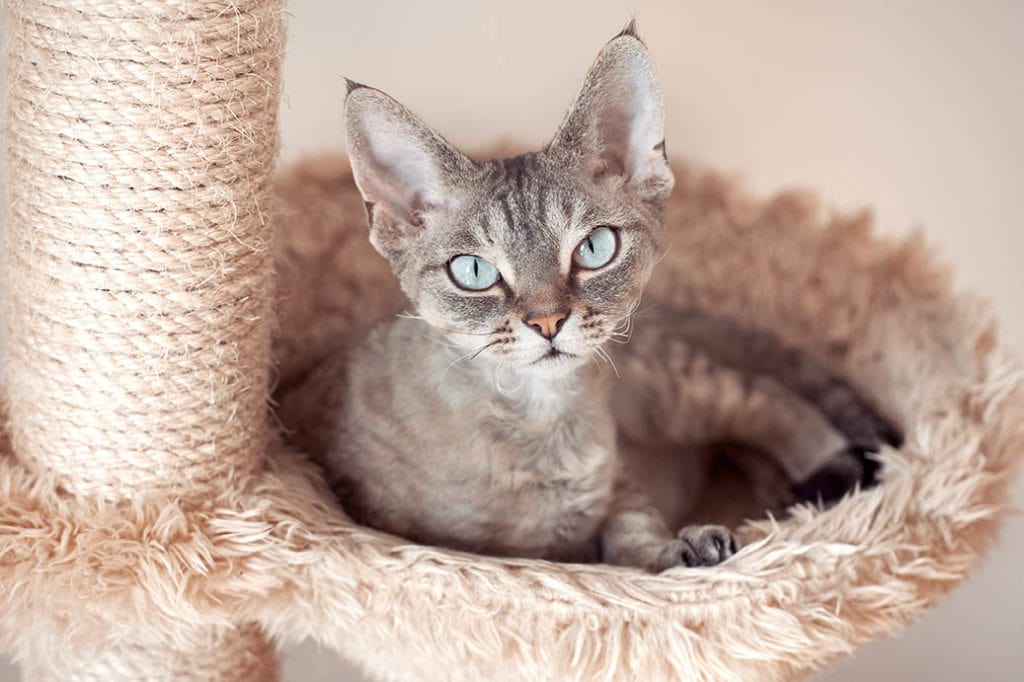
The fairytale-like Devon Rex hails from the stunning, coastal county of Devon in the UK. Like the Cornish Rex, the Devon Rex is the result of a genetic mutation, and the first of the breed, Kirlee, was a surprise birth in the 1950s. Kirlee’s mother was a stray cat taken in by a Miss Cox from Devonshire.
Appearance
Devon Rex cats look like they dropped right out of the pages of a fairytale or sci-fi book with their elfin facial features, huge ears on a tiny, well-defined face, and large, and oval-shaped eyes that can give them a somewhat solemn or intense expression. By contrast, the Cornish Rex has a more inquisitive expression and less impish facial features.
They also have slender bodies but are slightly larger on average than the Cornish Rex. The Devon Rex has a short, soft, wavy/curly coat like the Cornish Rex, but the Devon Rex’s coat is known for being especially fragile.
Personality
The Devon Rex is a real love of a cat. They’re famously laid-back, curious, fun-loving, clever, and mischievous and form solid bonds with the people they love. If you get a Devon Rex, prepare to be followed around and carefully observed, even while you’re completing the most mundane daily tasks. This is a breed that thrives off human interaction and doesn’t do well with distant owners.
Like the Cornish Rex, the Devon Rex is a very active and playful cat and will need plenty of mental stimulation. They have a special affinity for climbing and will appreciate cat trees and other climbing spots. They get along well with sensible children and make great playmates.
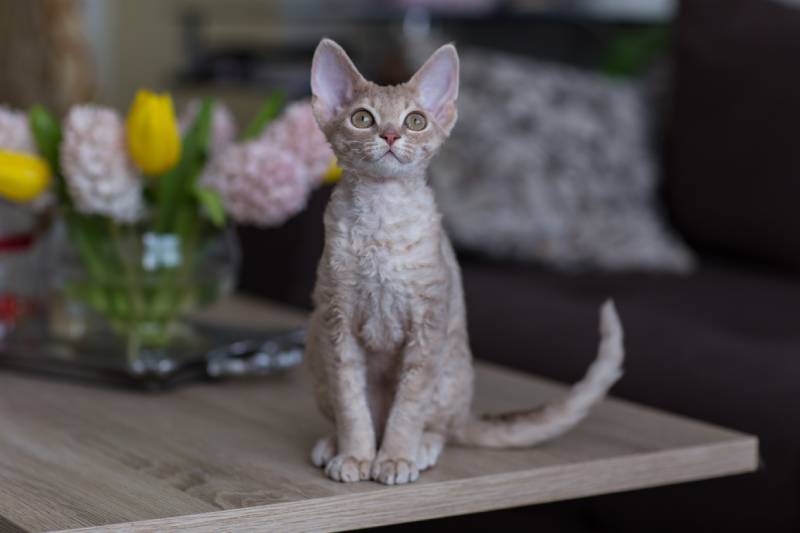
Training
The smart Devon Rex shouldn’t be too much of a challenge training-wise. One thing to be aware of, though, is that these cats are notoriously greedy in spite of their slender frames and will happily turn on the charm if it means getting some tasty morsels or a second helping of cat food. You might want to get your Devon Rex into a routine of eating only at certain times of the day.
Health & Care
The Devon Rex’s fragile coat is best groomed now and then with your hand or a chamois, as brushing can cause the hair to break off. This is one of the reasons you might spot bald patches on some Devon Rexes, so avoid overgrooming or tools that might be too tough for the delicate coat. The Devon Rex doesn’t tolerate cold well, either, so should be kept indoors.
Like the Cornish Rex, the Devon Rex is a largely healthy breed, but health conditions to watch out for include Devon Rex myopathy, a hereditary condition, fading kitten syndrome, and hypertrophic cardiac myopathy.
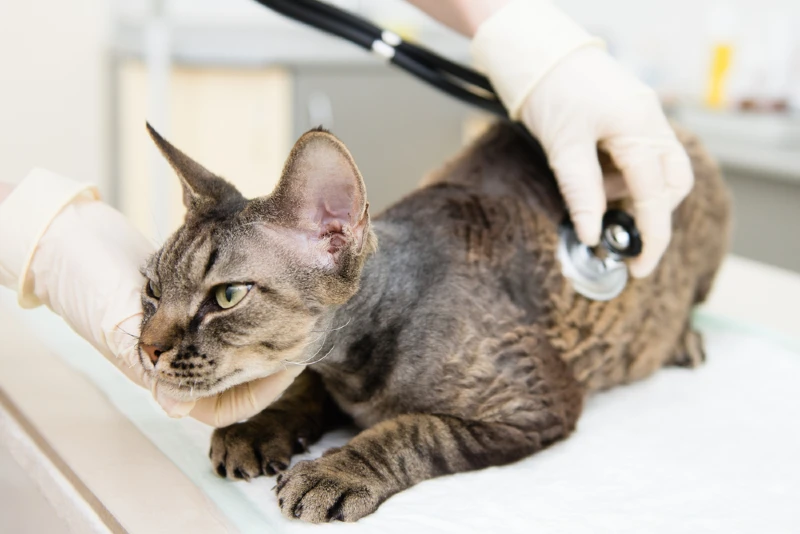
Suitable For:
As long as the Devon Rex family provides lots of love and attention, this cheerful little cat will fit perfectly into any home. They’re true “people cats” that love snuggling up with their own humans but will also quickly befriend new people and make pillows out of them in a flash.

Which Breed Is Right for You?
It’s a tough one because there isn’t much difference between the Devon Rex and the Cornish Rex, especially personality-wise. They’re both super sweet, playful cats that are highly likely to bond strongly with you, though the Devon Rex has a very delicate coat, and the Cornish Rex may need more regular bathing.
Both breeds are also highly intelligent, so, whichever one you go for, be prepared to provide them with plenty of entertainment to prevent them from becoming bored and destructive.
Featured Image Credit: Top – Cornish Rex (Kochmarjova, Shutterstock) | Bottom – Devon Rex (Oleksandr Volchanskyi, Shutterstock)
